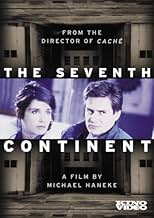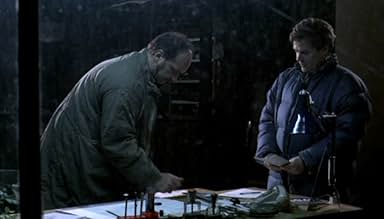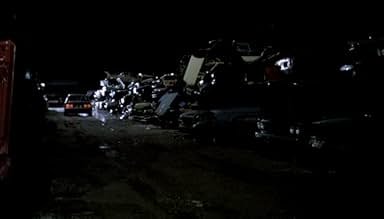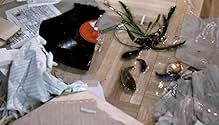AVALIAÇÃO DA IMDb
7,6/10
18 mil
SUA AVALIAÇÃO
Um planejamento de uma família europeia para fugir para a Austrália parece estar preso na sua rotina diária com incidentes menores. Contudo, por detrás da sua aparente calma, eles estão plan... Ler tudoUm planejamento de uma família europeia para fugir para a Austrália parece estar preso na sua rotina diária com incidentes menores. Contudo, por detrás da sua aparente calma, eles estão planejando algo sinistro.Um planejamento de uma família europeia para fugir para a Austrália parece estar preso na sua rotina diária com incidentes menores. Contudo, por detrás da sua aparente calma, eles estão planejando algo sinistro.
- Direção
- Roteiristas
- Artistas
- Prêmios
- 2 vitórias e 1 indicação no total
Jennifer Rush
- Self
- (cenas de arquivo)
- (não creditado)
- Direção
- Roteiristas
- Elenco e equipe completos
- Produção, bilheteria e muito mais no IMDbPro
Avaliações em destaque
Arguably, no greater cinematic interpreter of alienation exists in the world today than Austrian director Michael Haneke. Haneke shows us characters whose response to the world around them has deadened, people who have forgotten how to feel, how to love, how to care. The Seventh Continent, the first film of the trilogy that, with Benny's Video (1992) and 71 Fragments of a Chronology of Chance (1994), depicts what Haneke has called "my country's emotional glaciation." Based on a true story of the disintegration of a middle class Austrian family, the film has little plot, only incident and observation. Divided into three parts and shot in episodic fragments, as in his 2002 film Code Unknown, each fragment is tenuously connected by fadeouts in which scenes start and end abruptly. A mood of banality is established early in an extended sequence in which a car moves through a car wash showing all the details of detergent sprays, high-pressure washers, and rotating brushes. At the end of the car wash is a travel poster beckoning tourists to visit Australia with a peaceful scene of sand and water, a motif that is repeated periodically during the film.
The Schobers, husband George (Dieter Berner), wife Anna (Birgit Doll), and daughter Eva (Leni Tanzer), are the happily married family living next door. George is an engineer and Anna an optician. Eva is a bright child of about eight with deep, expressive eyes. The family moves through their morning ritual with precision -- brushing their teeth, feeding the fish, and eating breakfast with little conversation or emotional interaction. The camera avoids their faces, focusing on mundane objects such as a bowl of cereal, an alarm clock, a fish tank, a package of congealed broccoli. This preoccupation with objects underscores the lack of connection between the characters and the things they have acquired. We get our first hint that something is not right when Eva pretends to her teacher that she has lost her eyesight. Anna questions her about the incident, promising not to harm her if she tells the truth but, when Eva admits to the lie, suddenly slaps her across the face ignoring the fact that she is a very troubled little girl. It is from here that the cracks begin to widen.
Depicting ritualistic actions like counting of money at a supermarket, the distractions of television, the meaninglessness of work, the film reflects the powerlessness and isolation of people in modern society. Haneke chronicles a family enslaved to the structures they have created, operating in a morass of emotional vacuity. The first hour may seem slow but it builds considerable tension until it reaches a shattering climax. Little by little the family disengages. George quits his job and writes letters to his parents hinting of something dark about to happen. In the absence of a spiritual core, without the possibility of meaningful action, the family sinks deeper into an abyss, unraveling and discarding the tightly woven structures of their life. Similar in theme to Todd Haynes' 1995 film Safe but with three times the power, The Seventh Continent is a ruthlessly intelligent film that burns its way into your psyche, leaving an indelible mark that will forever haunt your dreams.
The Schobers, husband George (Dieter Berner), wife Anna (Birgit Doll), and daughter Eva (Leni Tanzer), are the happily married family living next door. George is an engineer and Anna an optician. Eva is a bright child of about eight with deep, expressive eyes. The family moves through their morning ritual with precision -- brushing their teeth, feeding the fish, and eating breakfast with little conversation or emotional interaction. The camera avoids their faces, focusing on mundane objects such as a bowl of cereal, an alarm clock, a fish tank, a package of congealed broccoli. This preoccupation with objects underscores the lack of connection between the characters and the things they have acquired. We get our first hint that something is not right when Eva pretends to her teacher that she has lost her eyesight. Anna questions her about the incident, promising not to harm her if she tells the truth but, when Eva admits to the lie, suddenly slaps her across the face ignoring the fact that she is a very troubled little girl. It is from here that the cracks begin to widen.
Depicting ritualistic actions like counting of money at a supermarket, the distractions of television, the meaninglessness of work, the film reflects the powerlessness and isolation of people in modern society. Haneke chronicles a family enslaved to the structures they have created, operating in a morass of emotional vacuity. The first hour may seem slow but it builds considerable tension until it reaches a shattering climax. Little by little the family disengages. George quits his job and writes letters to his parents hinting of something dark about to happen. In the absence of a spiritual core, without the possibility of meaningful action, the family sinks deeper into an abyss, unraveling and discarding the tightly woven structures of their life. Similar in theme to Todd Haynes' 1995 film Safe but with three times the power, The Seventh Continent is a ruthlessly intelligent film that burns its way into your psyche, leaving an indelible mark that will forever haunt your dreams.
A powerful, disturbing film, shot in a highly idiosyncratic style. Michael Haneke's dissection of Austrian alienation is astonishingly effective. The style is, for the first part of the film, full of such close-ups that we don't see the characters' faces for nearly half an hour, but we share with them their view of the breakfast cereals, shoes and shopping. It should be boring, but is instead gripping, a quiet build-up to the prosaic horrors to come.
It is hard to comment without revealing some of these horrors, but the overall effect is shattering, tolerable only because Haneke avoids any real involvement with the characters and their motivations. With hindsight this is a weakness, and I reached the end of the film with the feeling 'what was that all about?'. But it is a film to reflect on, unlike any other that I have seen. Don't miss it - unless you are feeling depressed!
It is hard to comment without revealing some of these horrors, but the overall effect is shattering, tolerable only because Haneke avoids any real involvement with the characters and their motivations. With hindsight this is a weakness, and I reached the end of the film with the feeling 'what was that all about?'. But it is a film to reflect on, unlike any other that I have seen. Don't miss it - unless you are feeling depressed!
Der Siebent Kontinent is a film you should watch. It is not pleasant neither does Michael Haneke uses any tricks in order to even interest you about the characters or their lives. Yet, it is as powerful as an atomic bomb during peace time. It is LOUD and its message (which is whatever you want it to be) is right in your face.
It is amazing how a masterpiece needs no soundtrack, fancy camera work or explicit and extended dialogs.
Unfortunately, it is very hard to find. The screenings are rare and no personal editions on VHS or DVD exist as far as I am aware. Many will recognize the "Piano Teacher" approach to directing but, this is as powerful as it can get. One of the finest examples of style not overlapping form.
Treat yourself with this lesson. Watch it if you can. Specially if you experienced depression at a given time in your life.
It is amazing how a masterpiece needs no soundtrack, fancy camera work or explicit and extended dialogs.
Unfortunately, it is very hard to find. The screenings are rare and no personal editions on VHS or DVD exist as far as I am aware. Many will recognize the "Piano Teacher" approach to directing but, this is as powerful as it can get. One of the finest examples of style not overlapping form.
Treat yourself with this lesson. Watch it if you can. Specially if you experienced depression at a given time in your life.
I went into this film with very high expectations. Unfortunately, I can't say that it lived up to them. The first hour is incredibly dull, as we watch an upper middle-class family lifelessly perform mundane tasks (take a shower, eat breakfast, tie shoes, etc.). I failed to sympathize with any of the characters, and some scenes dragged on so long that I found my mind wandering. I generally don't mind long takes, and even in other films by the same director (Funny Games, Benny's Video, etc.) thought they were used extremely well. However, here they were simply tedious.
The film wasn't totally a let down however; far from it. The last 45 minutes really picks up intensity and re-grabs the viewer's interest. I won't spoil anything for those who haven't seen it, but the scene in which the family destroys their own house and possessions is extremely well done. The ending is bleak and depressingly powerful, and I realized that it wouldn't have worked without the boring first hour. But that doesn't change the fact that it was boring.
Overall, I had trouble giving this film a number rating, but I guess it would be somewhere around a 6/10. I think it's possible that that number would change on a second viewing, but to be honest, I doubt I would ever want to watch this film again.
The film wasn't totally a let down however; far from it. The last 45 minutes really picks up intensity and re-grabs the viewer's interest. I won't spoil anything for those who haven't seen it, but the scene in which the family destroys their own house and possessions is extremely well done. The ending is bleak and depressingly powerful, and I realized that it wouldn't have worked without the boring first hour. But that doesn't change the fact that it was boring.
Overall, I had trouble giving this film a number rating, but I guess it would be somewhere around a 6/10. I think it's possible that that number would change on a second viewing, but to be honest, I doubt I would ever want to watch this film again.
Unnecessarily long and repetitive scenes intended to convey the boredom of the middle class Austrian family are undoubtedly a brilliant exhibition of cinematic art, but to me they only underline the totally unbelievable premise of the film. There was simply no reason for this family to be in despair: the man had a good white collar job and was recognized by his employer, the wife had a responsible entrepreneurial position and the daughter, while sometimes bizarre, was hardly a reason for her parents' perceived hopelessness. A man and a wife who are able to function effectively in every day life for the period of the film, three years, with no apparent psychoses, are not likely to engage in the incredible acts leading to the dramatic climax. The technical aspects of the film were interesting: short scenes, some without apparent relevance (the daughter's itch) with relatively long pauses between; the acting was a bit mechanical, sort of robotic, but that was undoubtedly intentional to convey the nihilistic mood of the protagonists. I didn't think the movie was worth watching, but most critics disagree, so if you enjoy this type of movie, then it is definitely for you.
Você sabia?
- CuriosidadesBased on real events.
- Citações
Georg Schober: We have to cancel the newspaper subscription
Anna Schober: Mhm
- ConexõesFeatured in Selección TCM: Michael Haneke (2012)
- Trilhas sonorasSend Me Roses
(uncredited)
Written by Günter Mokesch and Karin Raab
Performed by Günter Mokesch and Karin Raab
Principais escolhas
Faça login para avaliar e ver a lista de recomendações personalizadas
- How long is The Seventh Continent?Fornecido pela Alexa
Detalhes
Contribua para esta página
Sugerir uma alteração ou adicionar conteúdo ausente

Principal brecha
By what name was O Sétimo Continente (1989) officially released in India in English?
Responda

























